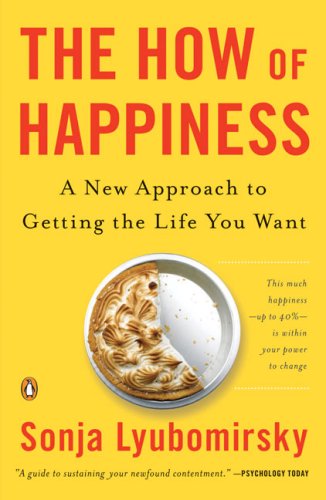Hey, it's a new weekly feature! Actually since this blog is only 48 hours old, all features are new, but this one is especially so. Since it's Friday, I thought it might be nice to take a break from discussing current happy science news. Instead, I'll use Casual Fridays to share some quick and easy happiness tips--all based on scientific evidence, of course.
On this casual-est of Fridays, I've picked the book
Happier: Learn the Secrets to Daily Joy and Lasting Fulfillment by
Tal Ben-Shahar. Mr. Ben-Shahar became famous for teaching "Positive Psychology" at Harvard, a class that filled up with 855 students in a single semester. In addition to writing several books on the subject, he has also appeared on The Daily Show:
http://www.thedailyshow.com/watch/thu-august-9-2007/tal-ben-shahar.
In a nutshell,
Happier is a guide to creating happiness by balancing what you want now (pleasure) vs. what you want in the future (meaning). To be as happy as possible, you should, do things that are both pleasurable and meaningful at the same time. For instance, watching TV is pleasurable, but not particularly meaningful (unless you're watching
The Wire, the greatest show ever!), so it won't make you happy in the long run. On the other hand, volunteering to clean up toxic sewage may be meaningful, but not pleasurable, so if you do it everyday you'll get burnt out before you feel long-term happiness.
To help you balance pleasure and meaning, Ben-Shahar suggests that you create a chart for yourself, mapping out your activities throughout the day and assigning a number value (on a scale of 1 to 5, 1 being the lowest) to each activity's meaning and pleasure. So you might give "Watching TV" a 2 in the "Meaning" column and a 4 in the "Pleasure" column. Then write down how much time per week you spend doing each activity. At the end of the week, look at your chart and try to make a commitment to spend more time doing activities with high scores in both "Meaning" and "Pleasure", and less time doing activities with low scores.
Whew. That may seem like a lot of work, but it only takes a few minutes per week, and it can be an eye-opening experience to actually look at the time you waste doing stuff that's not meaningful or pleasurable. Like tallying up your expenditures for the week, actually seeing the numbers in front of you can make a huge difference in creating positive change.
So give it a try, then send us a comment to tell us how it goes--as long as commenting rates high enough on your chart.


















